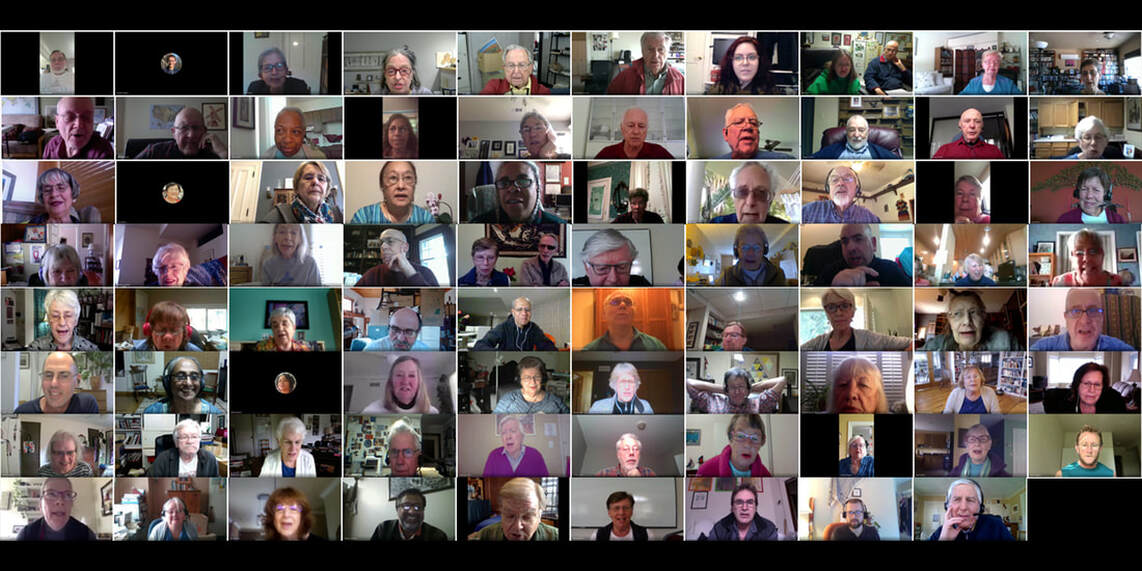|
For years, the focus of the ICA Social Research Center (SRC) has been to translate our massive collection of written and recorded material to a comprehensive and accessible website. Throughout that journey of digitizing documents and building websites, the dedicated team of volunteers also began exploring tools for working together virtually. By last fall, the team was reconsidering the in-person meetings that had brought colleagues to Chicago twice each year for the past decade. “We experimented with a ‘virtual’ Sojourn of hubs using Google Hangouts,” the organizing team wrote in November, 2019. “It is more difficult, [more] expensive, and less environmentally friendly to travel to Chicago and we can engage more people through the virtual work. We are discussing the implications of this for future Sojourns in the coming year.”
By May of 2020, the world had changed. The global COVID-19 pandemic had made physical gatherings difficult, and virtual gathering a necessity. But the team was ahead of the curve, and boldly announced that “the new form of the Social Research Center is being implemented as intersecting globally distributed virtual teams.” More than 100 people representing nine different countries participated in the most recent Sojourn, which took place entirely online between May 10 and 13, 2020. They explored eight of the nine curated collections, each facilitated by a different member of the SRC team. The session on Human Development, led by Doug Druckenmiller, explored the interplay between the local and global and the implications of the COVID-19 pandemic and the rise of virtual connectivity. Through the Social Change collection, Jim Wiegel asked participants: “What will it take to release large amounts of sustained human energy toward significant economic, political, and cultural change over the rest of this century? What do we have to offer?” Participants broke into small groups, which generated answers including: “Collective contributions of many efforts in many areas, sectors, and movements,” “Leveraging the positive pressure of contingency to move us forward,” “Supporting each others’ basic livelihood,” “Cultivating next shared practical visions of possibility,” “Re-examining and refiguring our assumptions, understandings, and values,” and “Summoning and tapping into the spiritual courage and skill to thrive.” At the end of Monday, participants in the Awakenment Forums session, facilitated by OliveAnn Slotta, identified the need to key into youth movements, such as Sunrise Movement, and to implement simplified participation methods and virtual technology. The group that explored the Imaginal Education collection with Karen Snyder focused on connecting the collections with the present moment through a variety of approaches, including encouraging people across generations to be storytellers and highlighting their stories with photos and videos. The conversation on Facilitation Methods began with Beret Griffith asking each participant to introduce themselves by naming when they first encountered ICA facilitation methods. The answers represented the full range of ICA history, including the foundation course known as RS1, the Fifth City project in Chicago, the global Human Development Projects, and contemporary Technology of Participation (ToP) training. After exploring the collection, the group reflected on the impressive volume of material and labor put in, remarking that the collection is “a living thing” that contains a breadth of application not fully known to contemporary facilitators. At the close of Tuesday, Nelson Stover facilitated a session on the Collaborative Networking collection. The group explored how ICA’s wealth of experience and well-connected associates create a body of wisdom that can contribute to current global change movements. Another group joined Jeanette Stanfield for a deep dive into the Inner Life collection and discussed the need for stories to ground the more abstract elements of the collection. Lynda Cock led a session on Spirit Movement, the final collection. The conversation generated the insight that “Nothing that someone else has done in the past will work now, but anything that was done can be a spark for someone to take something for today’s world.” That speaks to the spirit of the SRC, to translate the wisdom of ICA’s history into tools that can be used in the present. Participants met Wednesday afternoon for a closing session that summarized the insights from the eight prior conversations. ICA CEO Ted Wysocki addressed the group, sharing the words of colleague Bob Rafos, who called for us to “sound the call of commitment” and “demonstrate what is possible.” These words ring true for the SRC, which has continued to expand its reach through technology while solidifying its foundations through the collections. The SRC team has compiled a full report on the Sojourn, which includes participant names, links to recordings of each session, contact information for each collection, key takeaways, and more. Comments are closed.
|
|
4750 N Sheridan Rd, Chicago, IL 60640
773 769 6363 x 335 |
Copyright 2022. The Institute of Cultural Affairs. All rights reserved.

